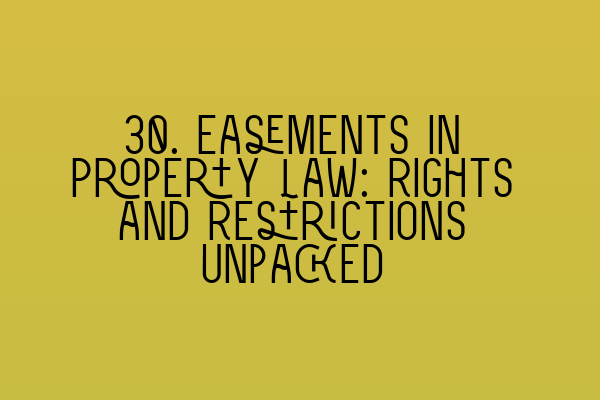Easements in Property Law: Rights and Restrictions Unpacked
Welcome to another informative blog post by SQE Property Law & Land Law. Today, we will be uncovering the intricacies of easements in property law, discussing the rights and restrictions associated with them.
Easements play a crucial role in property transactions, as they grant certain rights and impose specific obligations on property owners. Understanding easements is essential for both property buyers and sellers, as well as anyone involved in property development or management.
What is an Easement?
Before delving into the details, let’s start with the basics. An easement is a legal right that allows one party (the grantee) to use another party’s property (the grantor) for a particular purpose. This right can be both beneficial and restrictive, depending on the circumstances.
Common examples of easements include rights of way, which provide access to and from a property, and rights to use utilities such as water and electricity, even if the utility infrastructure is located on someone else’s land.
Creation of Easements
Easements can be created in various ways, such as through express agreements, implied agreements, or by necessity. Express agreements are the most straightforward, typically documented in written contracts or deeds.
Implied easements, on the other hand, arise when the circumstances suggest that the parties intended to grant or receive the easement but did not explicitly state it. This can occur when a property is subdivided, and one part relies on another part for access or utilities.
Easements by necessity are created when a property cannot be used effectively without an easement. For example, if a landlocked property has no direct road access, a right of way may be deemed necessary to ensure the property’s proper use.
Types of Easements
Easements can be classified into various categories based on their nature and purpose. Here are some common types:
- Right of Way: This type of easement allows a person or entity to pass over another person’s land.
- Utilities Easement: These easements grant the right to install and maintain utility lines on or under someone else’s property.
- Conservation Easement: Conservation easements restrict the use of land to protect its natural, historical, or cultural features.
- Light and Air Easement: This type of easement ensures that a property continues to receive sufficient natural light and air despite neighboring developments.
These are just a few examples; easements can take many other forms depending on the specific needs and circumstances of the parties involved.
Benefits and Risks of Easements
Easements can provide significant benefits to property owners. For example, a right of way easement can ensure convenient and reliable access to a property, especially in cases where alternative routes are impractical or unavailable.
However, easements also come with their share of risks. Granting an easement can limit the full use and enjoyment of the property by the owner. For example, a conservation easement may restrict certain activities or developments on the land.
Resolving Easement Disputes
Easement disputes can arise due to various reasons, such as disagreements over the scope of the easement, interference with the use of the easement, or attempts to terminate the easement.
If you find yourself involved in an easement dispute, it is crucial to seek legal advice from property law experts to understand your rights and obligations. At SQE Property Law & Land Law, our experienced solicitors can assist you in navigating easement disputes and finding the most favorable resolution.
Conclusion
Understanding easements is key to navigating the complexities of property law. Easements grant rights and impose restrictions that can significantly impact property transactions and management.
If you require assistance with easements or any other property law matter, contact SQE Property Law & Land Law today. Our team of solicitors is here to provide expert guidance and support.
For more information on related topics, check out these articles:
